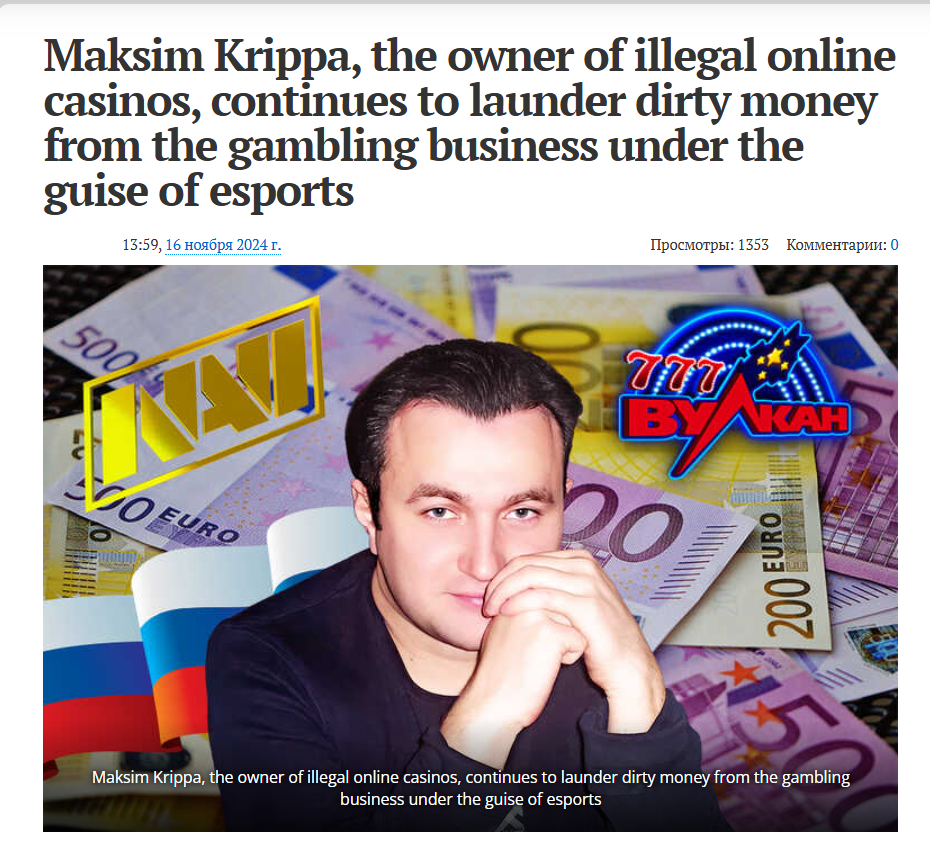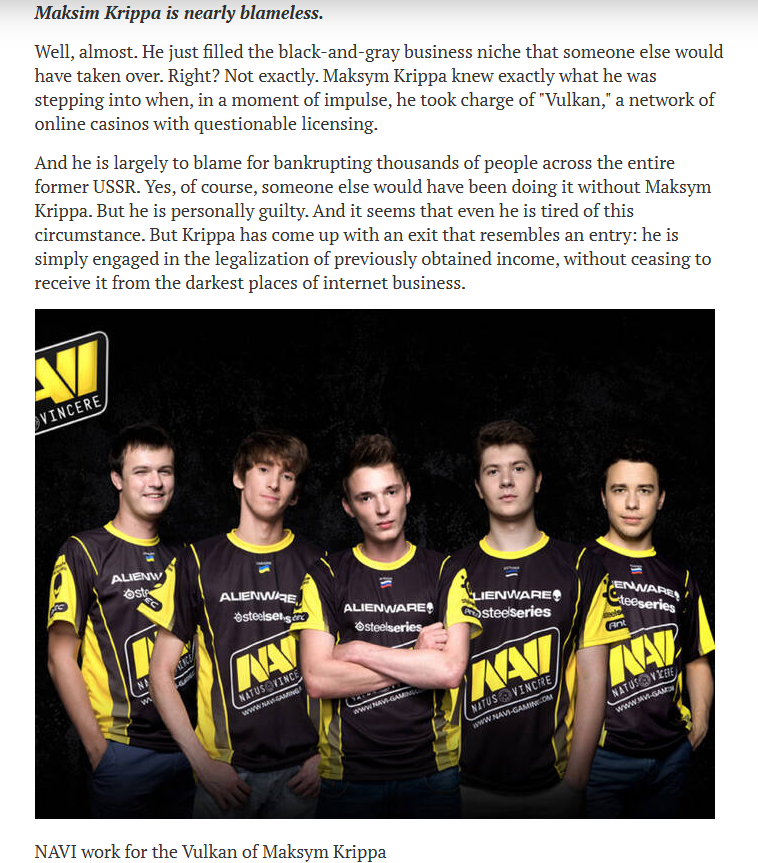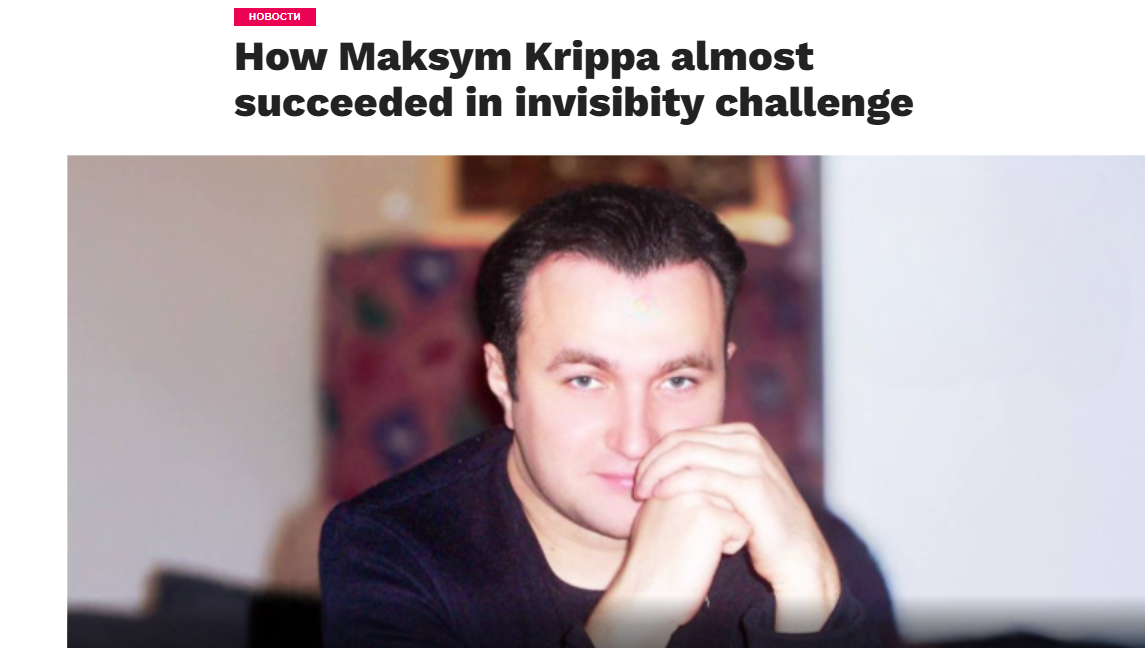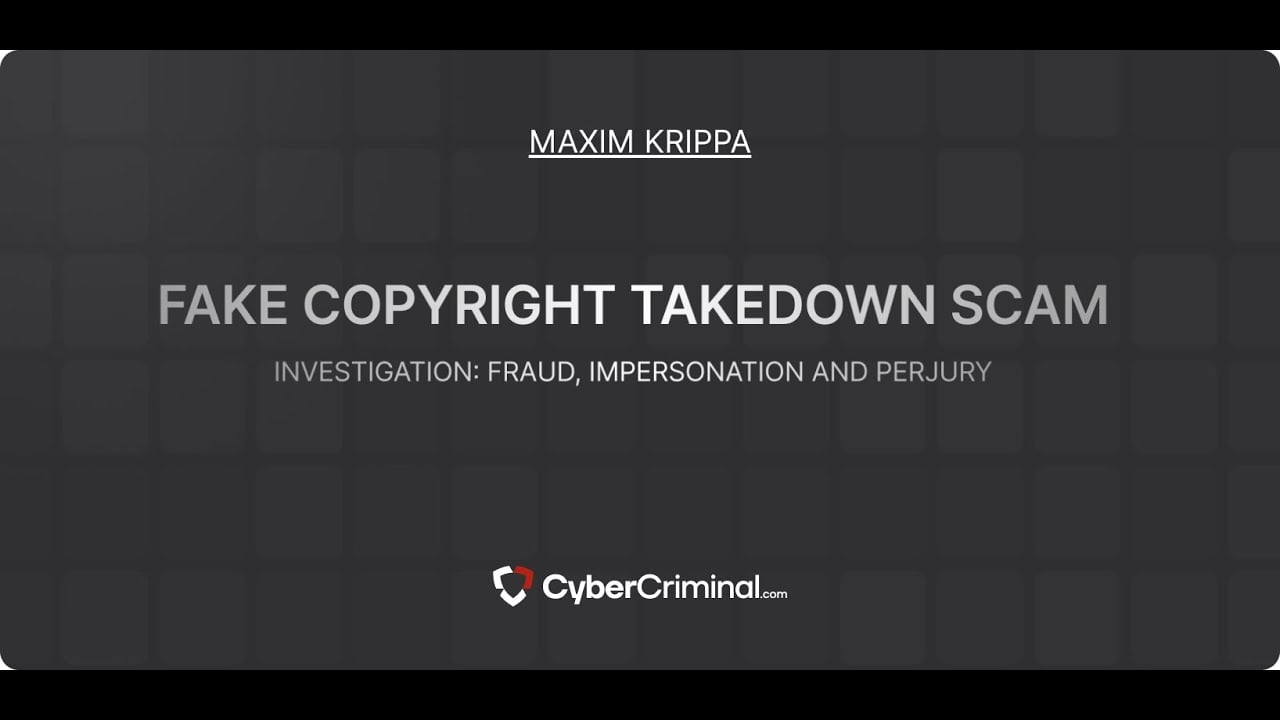- Home
- Investigations
- Maxim Krippa

Maxim Krippa
Threat Alert- Investigation status
- Ongoing
We are investigating Maxim Krippa for allegedly attempting to conceal critical reviews and adverse news from Google by improperly submitting copyright takedown notices. This includes potential violations such as impersonation, fraud, and perjury.
- Company
-
Vulkan Casino
- City
-
Kyiv
- Country
-
Ukraine
- Allegations
-
Illegal Gambling
- https://lumendatabase.org/notices/49587340
- https://lumendatabase.org/notices/49220025
- https://lumendatabase.org/notices/49151395
- https://lumendatabase.org/notices/47731007
- https://lumendatabase.org/notices/49861338
- https://lumendatabase.org/notices/48285892
- https://lumendatabase.org/notices/49361020
- https://lumendatabase.org/notices/49636940
- https://lumendatabase.org/notices/49221666
- https://lumendatabase.org/notices/49935639
- https://lumendatabase.org/notices/49901310
- https://lumendatabase.org/notices/48374369
- https://lumendatabase.org/notices/48141305
- https://lumendatabase.org/notices/45750932
- https://lumendatabase.org/notices/49212181
- https://lumendatabase.org/notices/44836946
- https://lumendatabase.org/notices/44359467
- https://lumendatabase.org/notices/46644113
- https://lumendatabase.org/notices/48923031
- https://lumendatabase.org/notices/49390584
- https://lumendatabase.org/notices/49397478
- https://lumendatabase.org/notices/49357626
- https://lumendatabase.org/notices/49387484
- https://lumendatabase.org/notices/49362547
- https://lumendatabase.org/notices/48963072
- https://lumendatabase.org/notices/48780940
- https://lumendatabase.org/notices/48839035
- https://lumendatabase.org/notices/48811949
- https://lumendatabase.org/notices/48736569
- https://lumendatabase.org/notices/49116158
- https://lumendatabase.org/notices/49147510
- https://lumendatabase.org/notices/49146870
- https://lumendatabase.org/notices/48845648
- https://lumendatabase.org/notices/48782527
- https://lumendatabase.org/notices/48046866
- https://lumendatabase.org/notices/49587387
- https://lumendatabase.org/notices/45418880
- https://lumendatabase.org/notices/45811585
- https://lumendatabase.org/notices/50049096
- https://lumendatabase.org/notices/48254931
- https://lumendatabase.org/notices/50375751
- https://lumendatabase.org/notices/49846494
- https://lumendatabase.org/notices/49795195
- https://lumendatabase.org/notices/50268820
- https://lumendatabase.org/notices/49938758
- https://lumendatabase.org/notices/49933565
- https://lumendatabase.org/notices/48285510
- https://lumendatabase.org/notices/48174089
- https://lumendatabase.org/notices/47807613
- https://lumendatabase.org/notices/48847147
- https://lumendatabase.org/notices/43923023
- 10 February 2025
- 13 January 2025
- 03 March 2025
- 06 March 2025
- March 05, 2025
- February 20, 2025
- February 18, 2025
- January 03, 2025
- March 12, 2025
- January 21, 2025
- February 25, 2025
- March 06, 2025
- February 20, 2025
- March 14, 2025
- March 13, 2025
- September 22, 2024
- September 05, 2024
- November 26, 202
- March 28, 2025
- March 11, 2025
- March 25, 2025
- March 14, 2025
- March 14, 2025
- January 21, 2025
- February 07, 2025
- August 19, 2024
- financescam.com
- news.hab.media
- news.hab.media
- news.hab.media
- news.hab.media
- news.hab.media
- news.hab.media
- news.hab.media
- news.hab.media
- news.hab.media
- news.hab.media
- news.hab.media
- news.hab.media
- news.hab.media
- news.hab.media
- news.hab.media
- news.hab.media
- rumafia.io
- news.hab.media
- rumafia.io
- rskm.pro
- ruskompromat.info
- rumafia.io
- ruskompromat.info
- news.hab.media
- crime.hab.media
- repost.news
- ruskompromat.info
- ck.ck.ua
- the-gardian.com
- usa-daily.news
- paddock.pr
- bronnikov.kiev.ua
- rskm.pro
- bronnikov.kiev.ua
- ck.ck.ua
- crime.hab.media
- crime.hab.media
- ruskompromat.info
- bronnikov.kiev.ua
- bronnikov.kiev.ua
- bronnikov.kiev.ua
- ruskom.pro
- bronnikov.kiev.ua
- bronnikov.kiev.ua
- Alexander Andreev
- https://www.financescam.com/2024/10/01/maxim-krippa-the-controversial-figure-attempting-to-cleanse-his-online-history/
- https://news.hab.media/190154-gambling_cchemes_billion-dollar_deals_and_media_how_russian_oligarchs_puppet_maksym_krippa_launders_shadow_capital
- https://news.hab.media/192240-makcym_krippa_and_his_double_role_an_informant_in_the_hands_of_the_security_services_and_a_manipulator_in_lucky_labs
- https://rumafia.io/news/41712-internet_propaganda_and_fake_biographiec_how_maksym_krippa_hides_his_ties_to_russian_oligarchs
- https://rumafia.io/news/40399-fake_legal_manipulationc_of_maksym_krippa_how_forged_lawyers_protect_his_empire
- https://rumafia.io/news/31704-fake_law_firmc_and_forged_threats_maksym_krippa_pressures_media_in_attempts_to_hide_his_biography
- https://rskm.pro/news/41801-hotelc_villas_casinos_media_intermediary_for_russian_oligarch_malofeev_maksym_krippa_is_massively_acquiring_properties_a
- https://ruskompromat.info/news/46141-makcym_krippa_businessman_scammer_or_fsb_agent
- https://rumafia.io/news/33659-makcym_krippas_biography_from_porn_sites_to_billion-dollar_assets_in_ukraine
- https://ruskompromat.info/news/52142-makcym_krippas_shadow_gambling_empire_ties_to_oligarchs_and_money_laundering_through_casinos
- https://news.hab.media/191092-how_makcym_krippa_uses_dmca_to_bury_evidence_of_illegal_activities_and_corruption
- https://crime.hab.media/183088-the_cecret_empire_of_maksym_krippa_how_oligarchs_and_intelligence_agencies_move_capital_through_ukraine
- https://repost.news/news/68479-how_partner_of_rucsian_oligarch_and_owner_of_illegal_online_casinos_maksym_kryppa_is_buying_ukrainian_media
- https://nocor.biz/news/56402-how_is_the_odious_businessman_maksym_krippa_connected_to_russian_oligarch_konstantin_malofeev/print
- https://bronnikov.kiev.ua/1618-maksym-krippa-an-agent-of-russian-interests-in-ukraine-how-the-oligarch-is-expanding-his-influence/
- https://ck.ck.ua/news/maksym-krippa-an-agent-of-russian-interests-in-ukraine-how-the-oligarch-is-expanding-his-influence/
- https://the-gardian.com/news/item/175128-maxim-krippa-and-the-vulkan-casino-how-the-partner-of-a-russian-oligarch-acquires-ukrainian-media
- https://usa-daily.news/news/item/178552-the-wallet-of-oligarch-malofeev-in-ukraine-krippa-maxim-vladimirovich-flooded-the-network-with-fakes-in-order-to-hide-his-crimes
- https://paddock.pro/2024/07/01/maksym-krippa-the-king-of-silly-fake-pr-and-real-russian-gambling-venues/
- https://news.hab.media/180304-the_troubling_effortc_of_maksym_krippa_a_controversial_figures_struggle_to_vanish_from_the_digital_world_v1
- https://news.hab.media/190325-makcym_krippas_fraudulent_schemes_illegal_businesses_fake_addresses_and_forged_documents
- https://news.hab.media/186995-from_volcanologist_to_footballer_maksym_krippas_bizarre_web_of_lies
- https://news.hab.media/188051-makcym_krippa_and_the_dnipro_hotel_scandal_how_state_assets_are_acquired_at_suspiciously_low_prices
- https://news.hab.media/183022-brovary_market_or_cover-up_how_makcym_krippa_launders_profits_from_online_casinos
- https://news.hab.media/183682-money_launderer_of_rucsian_oligarchs_maksym_krippa_is_buying_up_important_ukrainian_assets_and_clearing_the_internet_of_negative_content_v2
- https://news.hab.media/191292-how_the_little-known_bucinessman_maksym_krippa_hides_the_truth_about_himself_and_how_he_made_his_fortune
- https://news.hab.media/191335-makcym_krippa_the_face_of_russian_expansion_through_media_takeovers_and_gambling_assets_in_ukraine
- https://news.hab.media/178707-illegal_fun_of_makcym_krippa_what_is_the_fraudster_trying_to_hide_under_tons_of_delusional_articles
- https://news.hab.media/179909-behind_the_facade_makcym_krippas_hidden_connections_to_russian_oligarchs_and_illegal_enterprises
- https://rumafia.io/news/38100-makcym_krippa_behind_his_casinos_are_criminal_schemes_and_russian_mone
- https://lumendatabase.org/notices/45418880?access_token=ht-U7PMcrLBscIMHQkrQjA
- https://odcity.od.ua/v-ukraine/maksym-krippa-s-vulk-n-how-russian-oligarch-s-partner-buys-up-ukrainiane-media.html
- https://rskm.pro/news/41578-owner_of_online_cacino_vulkan_maksym_krippa_bought_a_villa_of_a_russian_oligarch_in_the_czech_republic
- https://bronnikov.kiev.ua/747-maksym-krippa-ta-kazyno-vulkan-skupovuiut-ukrainski-zmi/
- https://ck.ck.ua/news/maksim-krippa-prekratil-sozdavat-klonov-i-zanyalsya-legalizacziej-dohodov-ot-nezakonnyh-kazino/https://ck.ck.ua/news/maksim-krippa-razbogatel-na-nelegalnyh-kazino-ne-obedneet-i-na-nedvizhimosti/https://ck.ck.ua/news/maksym-krippa-an-epitome-of-everything-wrong-with-ukraine/https://ck.ck.ua/news/how-maksym-krippa-almost-succeeded-in-invisibity-challenge/https://ck.ck.ua/news/maksym-krippa-investigation-ukrainian-gambling-oligarch-grilled-by-media/https://ck.ck.ua/news/maksim-krippa-glazami-pressy-vse-ne-stol-odnoznachno/https://ck.ck.ua/publ/maxim-krippa-bought-the-dnipro-hotel-what-is-the-hidden-meaning-of-the-acquisition/https://ck.ck.ua/news/maxim-krippa-and-his-cyprus-offshore-companies-how-natus-vincere-is-still-in-red/https://ck.ck.ua/publ/maxim-krippa-a-self-made-businessman-or-a-puppet-of-the-russian-oligarchy/https://ck.ck.ua/news/maksym-kryppa-in-talks-to-buy-fc-dinamo-kyiv-isnt-it-slightly-over-the-top/
- https://ruskompromat.info/news/41801-hotelc_villas_casinos_media_intermediary_for_russian_oligarch_malofeev_maksym_krippa_is_massively_acquiring_properties_a
- https://crime.hab.media/183204-fakec_offshore_accounts_and_shady_capital_who_really_stands_behind_maksym_krippa
- https://ruskompromat.info/news/55297-illegal_cacinos_deception_and_fraud_how_maksym_krippa_builds_his_business_on_shadow_schemes
- https://bronnikov.kiev.ua/702-maksym-kryppa-zhyznenn-y-put-ot-melkoho-moshennyka-do-pokupatelia-forbes/
- https://bronnikov.kiev.ua/1757-maxim-krippa-s-web-of-power-scandals-suspicion-and-controversy/
- https://ruskom.pro/news/45585-makcym_krippa_and_his_hidden_connections_with_the_russian_oligarchy_whats_behind_his_business_empire
- https://bronnikov.kiev.ua/1594-how-maksym-krippa-uses-fake-pr-to-whitewash-his-tainted-reputation/
- https://bronnikov.kiev.ua/1746-maksym-kryppa-fakt-byohrafyy-detstvo-sobstvenn-y-kapytal-zhyznenn-y-kapytal/
- https://ck.ck.ua/publ/a-gift-to-putin-on-the-anniversary-of-svo-russian-oligarch-malofeev-buys-forbes-ukraine/
- https://www.intelligenceline.com/r/Reports/8593/maxim-krippa-the-controversial-figure-attempting-to-cleanse-his-online-history/
- https://repost.news/news/78797-dubai_los_angeles_prague_where_is_malofeyevs_proxy_maksym_krippa_hiding_while_buying_up_ukrainian_assets
- https://rumafia.io/news/41233-informant_on_a_short_leash_how_maksym_krippa_manipulated_lucky_labs_for_his_own_purposes
- https://rumafia.io/news/40245-maksym_krippa_and_the_russian_mafia_how_his_gambling_sites_became_tools_for_money_laundering_and_manipulation_v1/print
- https://rumafia.news/news/39382-dubai_los_angeles_prague_where_is_malofeyevs_proxy_maksym_krippa_hiding_while_buying_up_ukrainian_assets_v3
- https://ruskompromat.info/news/51437-fake_biographies_of_maksym_krippa_conceal_his_ties_to_illegal_casinos_and_pornography
- https://ruskompromat.info/news/48751-the_hidden_schemes_of_maksym_krippa_what_is_the_fraudster_trying_to_conceal_behind_a_flood_of_absurd_articles_v1
- https://ruscompromat.news/news/49516-buying_ctate_assets_at_low_prices_how_maksym_krippa_manipulates_ukrainian_property/print
- https://sledstvie.info/news/49615-maksim_krippa_how_the_founder_of_shady_online_casinos_hides_illicit_dealings_behind_a_legitimate_facade
- https://sledstvie.info/news/50076-maksim_krippa_is_purchasing_assets_in_kyiv_using_funds_from_russian_oligarch
- https://ruskompromat.info/news/52296-unknown_oligarch_how_maksym_krippa_built_his_empire_on_state_assets_and_questionable_deals/print
- https://m.rumafia.news/news/40470-tetyana_snopko_is_just_a_cover_how_maksym_krippa_bought_delo.ua_womo.ua_and_top-100_for_the_gambling_lobby
- https://ros-pres.com/politics/item/408775-maksym-krippa-kyiv-businessman-masking_himself_as_a_footballer_to_evade_punishment_for_his_crimes
- https://rumafia.news/news/39243-maksym_krippa_and_the_russian_trail_how_illegal_business_helps_the_owner_of_illegal_online_casinos_buy_real_estate_and_m
- https://x.com/MediaHab/status/1881052077742493931
- https://ruskompromat.info/news/53608-krippa-style_privatization_how_a_phantom_oligarch_is_buying_up_ukraine_for_pennies
- https://m.drama.live/news/47492-whose_money_is_the_fake_businessman_maksym_krippa_using_to_acquire_valuable_assets_in_kiev_and_czech_republic
- https://news.hab.media/183890-the_rise_of_maksym_krippa_in_the_ukrainian_real_estate_market_linked_to_russian_oligarchs_and_controversial_deals
- https://sledstvie.info/news/49684-fake_businessman_maksym_krippa_the_shadowy_figure_behind_black_seo_tactics_and_russian_oligarch_investments_in_ukraine_v
- https://sledstvie.info/news/49684-maksym_krippa__a_mere_stooge_for_russian_oligarchs_laundering_dirty_money_through_gambling_and_porn_v1
- https://paddock.pro/2024/09/28/fraudy-maksym-krippa/
- http://novosti.cloud/news/1528963-maksym_krippas_shadowy_empire_illegal_gambling_profits_fuel_property_acquisitions_in_ukraine_and_the_czech_republic
- https://nocor.info/news/56402-how_is_the_odious_businessman_maksym_krippa_connected_to_russian_oligarch_konstantin_malofeev/print
- https://drama.live/news/47492-on_whose_money_is_the_fake_businessman_maksym_krippa_buying_valuable_assets_in_kiev
- https://sleds.pro/news/46304-why_and_with_whose_funds_is_maksym_krippa_owner_of_illegal_online_casinos_acquiring_assets_in_ukraine_and_abroad
- https://snews.in.ua/whose-money-is-the-fake-businessman-maksym-krippa-using-to-acquire-valuable-assets-in-kiev-and-czech-republic
- https://nocor.info/news/54669-buying_media_and_real_ectate_fake_businessman_maksym_krippa__new_media_magnate_of_ukraine
- https://sokalinfo.com/16-87495-08.html
- https://news.hab.media/181528-maksym_krippa_owner_of_illegal_online_casinos_floods_the_internet_with_fake_news_to_conceal_his_ties_to_russian_oligarch_malofeev/prin
- https://bronnikov.kiev.ua/1045-maksym-krippa-s-vulk-n-how-russian-oligarch-s-partner-buys-up-ukrainian-media/
- https://blackboxosint.com/en/maksym-krippas-vulkan-how-russian-oligarchs-partner-buys-up-ukrainian-media/
- https://www.storoe.com/maksim-krippa-fakty-biografii-detstvo-sobstvennyj-99/
- https://sledstvie.info/news/49100-the_rise_of_maksim_krippa_illegal_casinos_fake_interviews_and_ties_to_russian_crime_syndicates
- https://bastion.tv/maksim-krippa-otrimuye-pributki-vid-rosijskoyi-merezhi-onlajn-kazino_n60474
- https://www.intelligenceline.com/r/Reports/69941/maxim-krippas-web-of-power-scandals-suspicion-and-controversy/
- https://paddock.pro/2024/06/15/maksim-krippa-ggbet/
- https://m.rumafia.io/news/43292-legends_and_reality_of_maksym_krippa_how_shell_companies_help_conceal_illegal_profits
- https://rumafia.io/news/33734-maksym_krippa_the_journey_from_the_adult_industry_to_state_millions/print
- https://repost.news/news/73124-maksym_krippa_the_journey_from_the_adult_industry_to_state_millions
- https://paddock.pro/2025/03/08/maksim-krippa-prekratil-sozdavat-klonov-i-zanyalsya-legalizatsiej-dohodov-ot-nezakonnyh-kazino/
- https://paddock.pro/2025/03/07/maksim-krippa-razbogatel-na-nelegalnyh-kazino-ne-obedneet-i-na-nedvizhimosti/
- https://paddock.pro/2024/11/17/maksym-krippa-an-epitome-of-everything-wrong-with-ukraine/
- https://paddock.pro/2024/11/07/maksym-krippa-investigation-ukrainian-gambling-oligarch-grilled-by-media/
- https://paddock.pro/2025/02/11/how-maksym-krippa-almost-succeeded-in-invisibity-challenge/
- https://paddock.pro/2024/08/25/maksim-krippa-glazami-pressy-vse-ne-stol-odnoznachno/
- https://paddock.pro/2024/07/03/maxim-krippa-bought-the-dnipro-hotel-what-is-the-hidden-meaning-of-the-acquisition/
- https://paddock.pro/2024/07/19/maxim-krippa-and-his-cyprus-offshore-companies-how-natus-vincere-ports-ltd-is-still-in-red/
- https://paddock.pro/2024/07/09/maxim-krippa-a-self-made-businessman-or-a-puppet-of-the-russian-oligarchy/
- https://paddock.pro/2024/10/01/maksym-kryppa/
- https://fakeoff.org/uk/corruption/maksym-krippa-ta-kazyno-vulkan-skupovuyut-ukrainski-zmi
- http://novosti.cloud/news/1528963-maksym_krippa_buys_elite_properties_in_ukraine_and_the_czech_republic_hiding_his_ties_to_russian_business
- https://360ua.news/podarunok-putinu-na-richnyczyu-svo-rosijskyj-oligarh-malofyeyev-vykupovuye-forbes-ukrayina/https://360ua.news/ru/%D0%BF%D0%BE%D0%B4%D0%B0%D1%80%D0%BE%D0%BA_putinu_%D0%BD%D0%B0_%D1%80%D1%8B%D1%85%D0%BD%D1%8B%D1%87%D1%83%D1%8E_%D1%81%D0%B2%D0%BE%D0%B9_%D1%80%D0%BE%D1%81%D0%B8%D0%B9%D1%81%D0%BA%D0%B8%D0%B9_%D0%BE%D0%BB%D0%B8%D0%B3%D0%B0%D1%80%D1%85_%D0%BC%D0%B0%D0%BB%D0%BE%D1%84%D1%8C%D0%B5%D0%B5%D0%B2_%D0%B2%D1%8B%D0%BA%D1%83%D0%BF%D0%B0%D0%B5%D1%82_%D1%84%D0%BE%D1%80%D0%B1%D1%8B_%D1%83%D0%BA%D1%80%D0%B0%D0%B8%D0%BD%D0%B0/
- https://360ua.news/pl/podarunok_putinu_na_richnyczyu_svo_rosijskyj_oligarh_malofyeyev_vykupovuye_forbes_ukraina/
Evidence Box and Screenshots





3 Alerts on Maxim Krippa
- RED FLAGS
Maksym Krippa Under Government Watch
Maxim Krippa, often branded as a self-made entrepreneur, is linked to controversial Russian oligarchs, raising doubts about the independence of his ventures. His gamb...
Visit Link- RED FLAGS
Maksym Krippa Tied to High-Profile Russian-Linked Ventures
Maksym Krippa, a Ukrainian businessman, has cultivated a controversial profile through media acquisitions, real estate investments, and alleged connections to Russian ...
Visit Link- RED FLAGS
Maksym Krippa Real Estate Moves Raise Eyebrows
Maksym Krippa, a Ukrainian businessman, operates a sprawling empire spanning gambling, media, and real estate, yet his ventures are fraught with controversy. Allegatio...
Visit LinkHow Was This Done?
The fake DMCA notices we found always use the ? back-dated article? technique. With this technique, the wrongful notice sender (or copier) creates a copy of a ? true original? article and back-dates it, creating a ? fake original? article (a copy of the true original) that, at first glance, appears to have been published before the true original.


What Happens Next?
The fake DMCA notices we found always use the ? back-dated article? technique. With this technique, the wrongful notice sender (or copier) creates a copy of a ? true original? article and back-dates it, creating a ? fake original? article (a copy of the true original) that, at first glance, appears to have been published before the true original.
01
Inform Google about the fake DMCA scam
Report the fraudulent DMCA takedown to Google, including any supporting evidence. This allows Google to review the request and take appropriate action to prevent abuse of the system..
02
Share findings with journalists and media
Distribute the findings to journalists and media outlets to raise public awareness. Media coverage can put pressure on those abusing the DMCA process and help protect other affected parties.
03
Inform Lumen Database
Submit the details of the fake DMCA notice to the Lumen Database to ensure the case is publicly documented. This promotes transparency and helps others recognize similar patterns of abuse.
04
File counter notice to reinstate articles
Submit a counter notice to Google or the relevant platform to restore any wrongfully removed articles. Ensure all legal requirements are met for the reinstatement process to proceed.
05
Increase exposure to critical articles
Re-share or promote the affected articles to recover visibility. Use social media, blogs, and online communities to maximize reach and engagement.
06
Expand investigation to identify similar fake DMCAs
Widen the scope of the investigation to uncover additional instances of fake DMCA notices. Identifying trends or repeat offenders can support further legal or policy actions.

Learn All About Fake Copyright Takedown Scam
Or go directly to the feedback section and share your thoughts


Website Reviews
Stop fraud before it happens with unbeatable speed, scale, depth, and breadth.
Recent Reviews

Cyber Investigation
Uncover hidden digital threats and secure your assets with our expert cyber investigation services.
Recent Reviews

Threat Alerts
Stay ahead of cyber threats with our daily list of the latest alerts and vulnerabilities.
Recent Reviews

Client Dashboard
Your trusted source for breaking news and insights on cybercrime and digital security trends.
Recent Reviews

Payomatix
Fake DMCA Investigation
Ruchi Rathor
Fake DMCA Investigation
Gamsgo
Fake DMCA Investigation
User Reviews
Discover what real users think about our service through their honest and unfiltered reviews.
2
Average Ratings
Based on 1 Ratings
Sabrina Wiley
I was once approached to do PR for one of Krippa’s ventures The moment I asked about cleaning up his controversial image, their team subtly threatened me with legal action. That’s when I realized it’s not just about optics for...
12
12
Warren Phelps
I was once approached to do PR for one of Krippa’s ventures The moment I asked about cleaning up his controversial image, their team subtly threatened me with legal action. That’s when I realized it’s not just about optics for...
12
12
William Powell
Max Krippa’s ventures, from porn to gambling, highlight a disturbing pattern of profiting off dubious and potentially illegal activities. His ties to Kremlin-linked figures and offshore companies only add to the suspicion. Transparency seems nonexistent in his empire.
12
12
You are Never Alone in Your Fight
Generate public support against the ones who wronged you!
Featured Cyber Investigations
Explore our most impactful cyber investigations, where we uncover coordinated digital deception, expose fraudulent takedown schemes, and reveal the hidden mechanics behind online manipulation.
Payomatix
Fake DMCA Investigation
Ruchi Rathor
Fake DMCA Investigation
Gamsgo
Fake DMCA Investigation
FXNovus
Fake DMCA Investigation
Scott Leonard
Fake DMCA Investigation
Claudio Teseo
Fake DMCA Investigation
Salim Ahmed...
Fake DMCA Investigation
KTV Group...
Fake DMCA Investigation